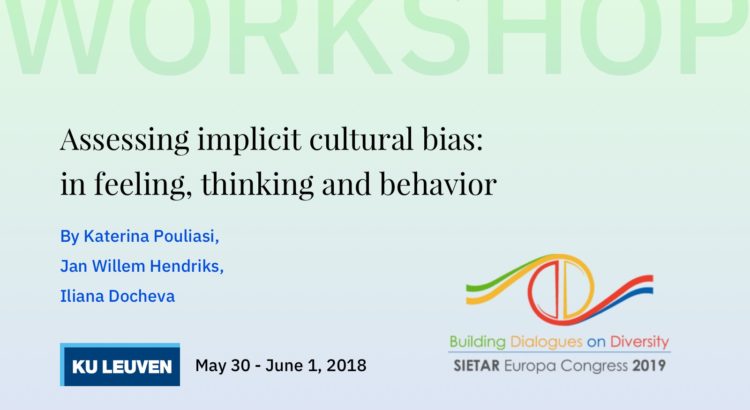(This workshop has been blind reviewed by the 2019 SIETAR Europa committee. We were extremely honoured to hear that both reviewers evaluated the workshop as 'excellent' See evaluations below)
The workshop was presented in the 2019 SIETAR Europa Congress Track 4: Education and Intercultural Professions – Recent research and other critical developments on the 30th of May 2019 in Leuven, Belgium
Theoretical framework
This workshop derives from the Cultural Tasks Analysis of Implicit Independence model as premised by the prominent cultural psychologists Kitayama, Park, Sevincer, Karasawa & Uskul (2009). Their approach is justified on basis of reviews of comparative databases from across many behavioral sciences published in top scientific journals (Henrich, Heine, Norenzayan, 2010; Henrich J., 2014). This shows strong evidence that growing up in societies that are Western, Educated, Industrialized, Rich, and Democratic (WEIRD) biases one toward becoming independent and a tendency for focused attention or dispositional reasoning. Whereas exposure in most other societies in the world supports a self-understanding as ‘interdependent’, and a trend towards holistic attention and situational or group reasoning. At the same time, biases in working together, like trustworthiness in collaborations, are also largely informed during early socialisation.
Cultural biases are called implicit because they mirror long term cultural tasks and social engagements. On the contrary, an explicit self-belief may be acquired later during adolescence or due to globalization effects (e.g., social media). Yet, such acquired belief is less likely to override implicit bias from one’s early socialisation. For example, contemporary Japanese may report endorsement of ‘Western’ beliefs (personal freedom) yet still feel and behave as interdependent.
Implicit bias is embedded in our spontaneous responses even if we are not aware of it. That’s why it is difficult to capture and measure implicit bias with explicit self-reporting evaluation scales.
Objectives
- Understand important differences between Implicit bias and Explicit beliefs
- Identify and draw one’s own Implicit Cultural Profile on domains that shown substantial across-cultures variability, in a following schema[1]:
Individual assessment / Group interactions on:
- Self-perception: Implicit Independence (Interdependence)
- In comparison to Explicit Self-Evaluation
- Reasoning: Implicit Dispositional (Situational) bias
- Attention Focused (Holistic) bias
- Motivation style
Theory: Framework of Cultural Task Analysis
- Slides, Video, Text, Charts,
- Published significant findings from US, Japan, UK, Germany, GR, NL in comparisons
- Assess one’s genuine ‘default’ cultural state towards becoming insider of ‘another’ culture, and gaining InterCultural Competence (ICC) — the ability to think and respond in an interculturally appropriate way (Deardoff, 2011).
- Transfer the -gained insights towards the own trainers’ role and – skills
- Exchange insights in communicational strategies
Format
We apply a highly interactive and inspiring workshop, inviting participants to exchange and learn with and from each other in the process. Through exercises and didactic methods we will link ICC with professional trainers and facilitating skills. We propose a shared foundation to use in order to create a closer connection between aspects of ICC and training skills
Target group: interculturalists, trainers, coaches, everyone interested in ICC and communication
Words: 445
Keywords:
Cultural bias, Implicit, Independent-Interdependent, (ICC) Intercultural Competence, Communication
[1] In a full program paricipants exercise in thinking and behavior as natives do (e.g., mothers, employees)
Authors/Presenters/ Assistant
- Workshop design, presenter: Dr. Pouliasi Katerina, in2cultures
- Assistance: Hendriks Jan Willem, Morpho Training & Mediation, Schouten & Nelissen
- Assistance, presentation, media : Docheva Iliana, Freelancer Intercultural Communication
The evaluation of the 2019 SIETAR Europa Congress reviewers:
It was certainly extremely inspiring and challenging to hear the evaluation of the 2019 SIETAR Europe Congress blind reviews, which have as follows:
OVERVIEW OF REVIEWS ------------------- Review 1 ======== Evaluation of the Contribution ------------------------------ Appropriateness of topic for SEU 2019 in general (10%): 4 - Excellent Originality and creativity of topic (10%): 4 - Excellent Organization and clarity of submission (10%): 4 - Excellent Overall contribution to advancing research / practice (10%): 4 - Excellent General attractiveness of paper for practitioners in the field (10%): 4 - Excellent Your overall Recommendation (50%): Accept as it Review 2 ======== Evaluation of the Contribution ------------------------------ Appropriateness of topic for SEU 2019 in general (10%): 4 - Excellent Originality and creativity of topic (10%): 4 - Excellent Organization and clarity of submission (10%): 4 - Excellent Overall contribution to advancing research / practice (10%): 4 - Excellent General attractiveness of paper for practitioners in the field (10%): 4 - Excellent Your overall Recommendation (50%): Accept as it
Workshop target groups
The workshop can be tailored to specific needs of various target groups
In interest? Express your interest and we will contact you promptly!
Literature
Henrich, J. (2014). Rice, psychology, and innovation. Science, 344(6184), 593-594.
Henrich, J. (2015). Culture and social behavior. Current opinion in behavioral sciences, 3, 84-89.
Kitayama, S., Park, H., Sevincer, A. T., Karasawa, M., & Uskul, A. K. (2009). A cultural task analysis of implicit independence: comparing North America, Western Europe, and East Asia. Journal of personality and social psychology, 97(2), 236.
Henrich, J., Heine, S. J., & Norenzayan, A. (2010). The weirdest people in the world?. Behavioral and brain sciences, 33(2-3), 61-83. (Cited by 4886)
Menon, T., Morris, M. W., Chiu, C. Y., Hong, Y. Y. (1999). Culture and the construal of agency: Attribution to individual versus group dispositions. Journal of personality and social psychology, 76(5), 701.
Nisbett, R. E., & Masuda, T. (2003). Culture and point of view. Proceedings of the National Academy of Sciences, 100(19), 11163-11170.
Pouliasi, K., & Verkuyten, M. (2007). Networks of meaning and the bicultural mind: A structural equation modeling approach. Journal of Experimental Social Psychology, 43(6), 955-963.
Verkuyten, M., & Pouliasi, K. (2002). Biculturalism among older children: Cultural frame switching, attributions, self-identification, and attitudes. Journal of Cross-Cultural Psychology, 33(6), 596-609.
Pouliasi, K., & Verkuyten, M. (2011). Self-evaluations, psychological well-being, and cultural context: The changing Greek society. Journal of Cross-Cultural Psychology, 42(5), 875-890.
Katerina’s Pouliasi scientific articles (abstracts)
Questions, interest, comments? Contact us!



